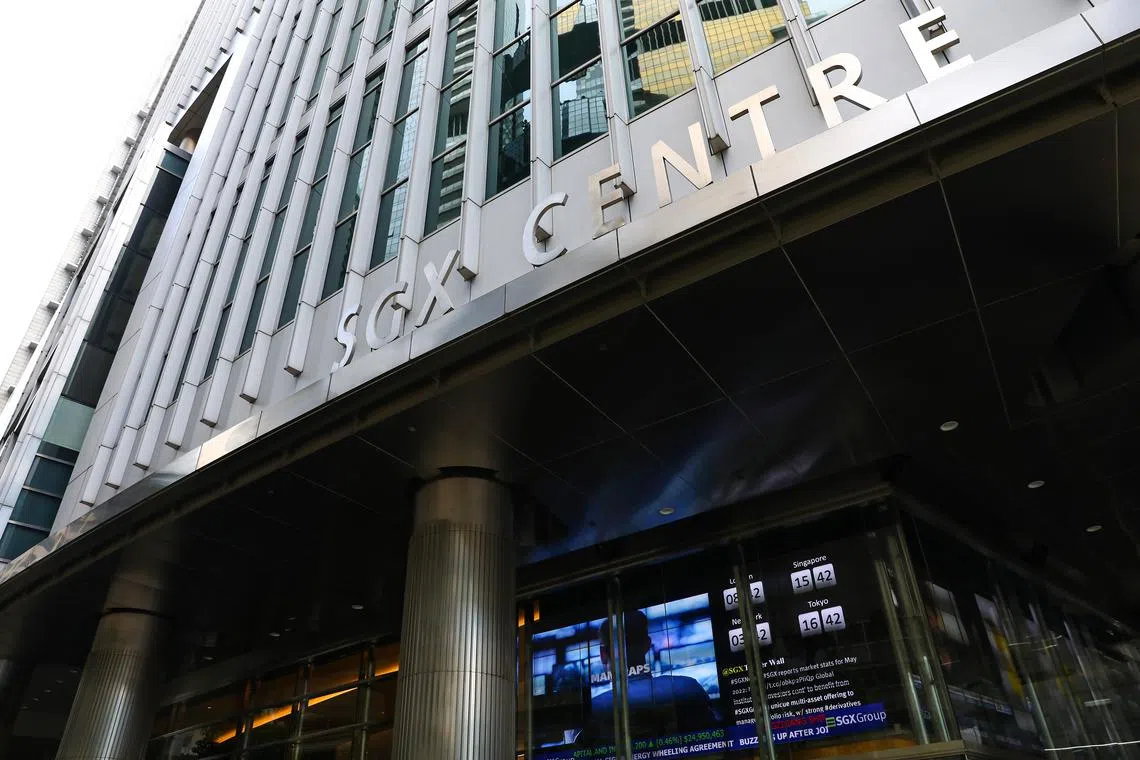Singapore property stocks lead market losses after buyer’s stamp duty hike in Budget
Sign up now: Get ST's newsletters delivered to your inbox

The benchmark Straits Times Index had fallen 1 per cent to 3,285.19 points as at 11.40am.
PHOTO: BT FILE
SINGAPORE - Local property stocks took a beating on Wednesday, a day after Singapore announced an increase in buyer’s stamp duty (BSD)
This came amid a general sell-off in Asian markets after US inflation data spurred rate hike fears.
The benchmark Straits Times Index closed 1.13 per cent lower at 3,280.82 points.
City Developments, one of Singapore’s biggest landlords, lost 3.2 per cent, while CapitaLand Integrated Commercial Trust, the largest real estate investment trust listed on the Singapore Exchange, saw a 2.04 per cent drop.
Mapletree Pan Asia Commercial Trust declined 2.89 per cent and Keppel DC Reit slipped 2.48 per cent.
Finance Minister Lawrence Wong, in his Budget speech on Tuesday, said the BSD rate for residential properties will rise from 4 per cent currently to 5 per cent for the portion of the value of the property in excess of $1.5 million and up to $3 million.
Meanwhile, residential real estate in excess of $3 million will be taxed at 6 per cent.
For non-residential properties, the portion of the value of the property in excess of $1 million and up to $1.5 million will be taxed at 4 per cent, while that in excess of $1.5 million will be taxed at 5 per cent. This is up from the current rate of 3 per cent.
Mr Brian Tan, a senior economist at Barclays Bank, said the impact of the BSD hike is unlikely to provide a significant penalty on home purchases, except for the very high-value transactions that have occasionally grabbed the headlines.
“Nonetheless, we believe the move hints at the Government’s continued discomfort with rising residential property prices,” he said.
Private home prices rose 0.4 per cent in the fourth quarter of 2022 from the previous quarter, while Housing Board resale prices climbed 2.3 per cent. The price gains came after the latest round of property cooling measures in September 2022, though the pace of growth slowed.
Mr Wong, who is also Deputy Prime Minister, noted in his Budget speech that even after the cooling measures moderated demand in the HDB resale market, some Singaporeans looking for their first homes find resale prices too high.
Referring to the minister’s comments, Mr Tan said: “This suggests more measures, or a recalibration of existing policies, are in store if prices keep rising.”
Analysts said there is room for more cooling measures.
Mr Arthur Pineda, head of Singapore research at Citigroup, said the sweet spot for the residential market of properties valued below $1.5 million – which accounted for about 46 per cent of total transactions in 2022 – remains intact.
He said the increased Central Provident Fund housing grant in the Budget for first-time home buyers purchasing HDB resale flats may result in upside pressure on HDB resale prices and, in turn, support mass-market and mid-end private residential prices, given upgrader demand in this segment.
Mr Tan speculated that if prices show a limited impact from the BSD hike, the Government may take “swift and decisive” action.
Ms Tricia Song, head of research for South-east Asia at real estate consultancy CBRE, said the higher BSD rates for higher-value properties in the residential and non-residential market would result in up to a 2 per cent increase in total costs for buyers.
“On its own, this is unlikely to have a significant impact on the market,” she said.
However, taking into consideration earlier wealth taxes and cooling measures for residential properties, as well as higher financing costs for both residential and commercial properties, transaction volumes in both residential and non-residential properties could slow down in the near term, she added.
Still, Ms Song believes that prices could be resilient, given the strong fundamentals of Singapore’s residential and commercial property sectors.
Singapore’s stock market on Wednesday was also depressed by a regional sell-off extending from China to Australia, following a decline on Wall Street on Tuesday.
The US stock benchmark Dow Jones Industrial Average fell by about 0.5 per cent after United States inflation for January came in at a higher-than-expected 6.4 per cent.
The inflation data raised concerns that the US Federal Reserve may need to hike its interest rates more than earlier estimates to cap rising prices.
Shares of Singapore’s biggest telco Singtel fell 2 per cent, while supermarket operator Sheng Siong declined 0.61 per cent. Singapore Airlines was down 1.36 per cent. Wilmar International, a leader in food products trade, dropped by 0.25 per cent.
Stocks in the retail and food and beverage sectors, such as Sheng Siong and Wilmar, are, however, likely to benefit from the Budget’s inflation offset measures, such as the GST Voucher scheme and the Assurance Package, which are expected to support consumer spending.



